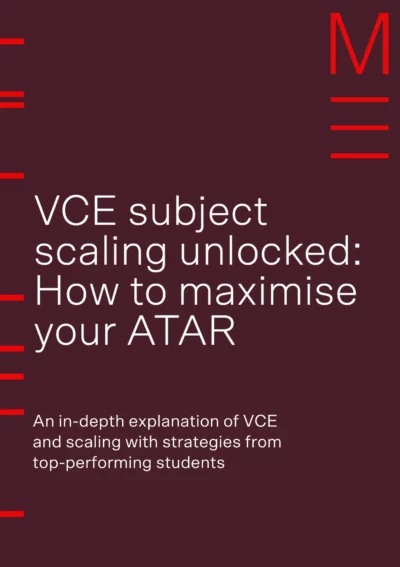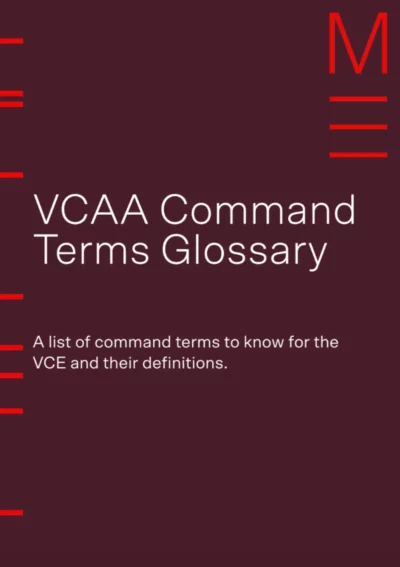Welcome to Matrix Education
To ensure we are showing you the most relevant content, please select your location below.
Select a year to see courses
Learn online or on-campus during the term or school holidays
Learn online or on-campus during the term or school holidays
Learn online or on-campus during the term or school holidays
Learn online or on-campus during the term or school holidays
Learn online or on-campus during the term or school holidays
Learn online or on-campus during the term or school holidays
Learn online or on-campus during the term or school holidays
Get HSC exam ready in just a week
Select a year to see available courses
Science guides to help you get ahead
Science guides to help you get ahead
Matrix teacher and VCE top achiever Janie shares how balance and routine helped her score a 98.45 ATAR.

Join 75,893 students who already have a head start.
"*" indicates required fields
You might also like

Join 8000+ students each term who already have a head start for English, Maths, OC/Selective Prep, Science, Biology, Chemistry or Physics.
School: East Doncaster Secondary College
ATAR: 98.45
University goal: Monash Radiography
I’m someone who believes that balance is key, especially when it comes to surviving and thriving in Year 12.
Throughout my VCE study, I made a conscious effort to maintain both my physical and mental well-being. Exercise was a big part of that routine—whether it was playing basketball or doing home workouts, it helped me clear my mind and manage stress more effectively.
I’ve always been a bit of a perfectionist when it comes to my studies. I like setting goals, staying organised, and challenging myself to improve. But I also learnt that pushing too hard without rest doesn’t work in the long run. Taking breaks, getting enough sleep, and allowing time to reset were just as important to my success as any study technique.
If you’re looking for real VCE top achiever’s advice, I hope my story shows you that success doesn’t have to mean sacrificing your well-being.
An in-depth explanation of VCE and scaling with strategies from top-performing students. Fill out your details below to get this resource emailed to you. "*" indicates required fields
Free 2025 VCE ATAR & Scaling Guide Download

Free 2025 VCE ATAR & Scaling Guide Download
English (EAL): 39.06
Specialist Mathematics: 50.11
Mathematical Methods: 45.17
Chemistry: 44.40
Chinese First Language: 44.01
Physics: 42.25
One of my biggest challenges during Year 11 and 12 was balancing school and life—especially when the workload became intense. Juggling long study hours while trying to make time for exercise, proper rest, and social activities often left me feeling overwhelmed and mentally drained.
My motivation would dip, and I found myself in a constant cycle of trying to catch up.
I eventually realised that pushing myself non-stop wasn’t sustainable and that burnout was a real risk if I didn’t make a change.
To overcome this, I decided to prioritise balance and change the way I viewed productivity—it wasn’t about how many hours I studied but about how effectively I used my time and energy.
I created a handwritten weekly timetable and stuck it on the wall above my study desk. Writing it out by hand helped me visualise my week, stay accountable, and I always knew what needed to be done and when.
I divided each day into blocks for school, study, exercise, rest, and breaks, based on upcoming SACs or subjects that needed more attention. I also made sure to schedule in workouts and basketball sessions to stay active and take mental breaks.
I colour-coded each subject and blocked off time for reviewing content, completing homework, and revising past topics.
On weekends, I kept space for catch-up or lighter review sessions and always included at least one proper rest day. This structure helped me find a rhythm that felt sustainable.
In Units 3/4 English, a subject I struggled with, I consistently handed in extra practice essays to my teacher and made sure to apply the feedback by rewriting or improving weaker sections. Over time, this helped me gain more confidence in my writing and lifted my performance.
I also studied with friends occasionally. Explaining concepts out loud or asking each other questions made things clearer and more engaging.
I knew staying productive during the holidays was important—but so was avoiding burnout. So, instead of studying all day, I set small, achievable goals each week.
I tracked them in a notebook and ticked them off as I went. That simple habit kept me organised, motivated, and let me keep learning without feeling like I was giving up my break.
Creating a flexible daily routine
Even in the holidays, I didn’t drop all structure. I followed a light routine—studying in the mornings when I was most focused, and keeping afternoons free for rest, exercise, or time with family and friends.
The key was flexibility. If plans changed, I adjusted without stress and stayed consistent across the week.
Reusing teacher feedback and revisiting past mistakes
One of the most valuable things I did during the break was review past SACs and feedback, especially in English. I kept a folder with teacher comments and reworked old essays or paragraphs based on what I’d been told. I also listed out my weak areas across subjects and made time to revisit those topics using notes and practice questions.
Facing my mistakes head-on, instead of avoiding them, helped me feel more confident for the new term.
Progress comes from building on your challenges, not avoiding them.
Start early and plan ahead
If there’s one piece of VCE top achiever’s advice I’d share, it’s to start early and stay consistent.
I began revising topics as they were taught, which helped reduce last-minute stress and made everything feel more manageable. As exams got closer, I followed a balanced revision timetable that allowed time for every subject—plus breaks to stay fresh.
Use past exam papers (and your mistakes)
Past exam papers were my go-to resource. They helped me understand how questions were asked and what examiners looked for. I did full papers under timed conditions, marked them strictly, and reviewed every mistake. I made quick notes on what went wrong and how to fix it, which helped me avoid making the same errors again.
I found that the best way to improve in Specialist Maths was through consistent exposure to a wide range of question types. I completed a large number of past exams and topic-specific questions. After each paper, I carefully reviewed every mistake, including the questions I was unsure about. I rewrote these in a separate notebook and made sure I could solve them confidently a second time.
Units 3/4 Chemistry was one of the subjects I really wanted to excel in, so I focused on understanding over memorisation. I created handwritten summary sheets and concept maps after each topic to simplify complex ideas and link them together visually.
Instead of starting with full exams, I tackled weak areas with topic-specific questions first.
I kept an error log for every mistake—what went wrong, the correct approach, and how to avoid it. Closer to exams, I switched to timed papers to build endurance.
This mix of clarity, structure and practice helped me feel calm and ready.
Stay consistent even when motivation drops.
It’s the daily small efforts, not the cramming, that truly make the difference.
1. Create a study routine that works for you
Tailor it to your energy levels and stick to it. Consistency beats intensity when it comes to long-term results.
2. Stay organised from the beginning
Use a planner or calendar to track SACs and goals so that nothing sneaks up on you.
3. Prioritise your well-being
Year 12 is a marathon, not a sprint. Sleep, exercise and breaks help you stay focused and avoid burnout.
1. Don’t overload your schedule
Studying for 10 hours straight every day isn’t realistic or sustainable. Quality matters more than quantity. Leave space for things that make you feel good.
2. Don’t treat mistakes as failure
Track them, learn from them—Every mistake is a step closer to improvement.
3. Don’t ignore your weak spots
Tackle them early—they’ll have the biggest impact on your results.
At the end of the day, the best VCE top achiever’s advice I can give is to stay steady, look after yourself, and trust your routine.
Understand exactly what exam questions are asking with the VCAA Command Terms Glossary Fill out your details below to get this resource emailed to you. "*" indicates required fields
Maximise your marks with VCAA Command Terms

Maximise your marks with VCAA Command Terms
Written by Guest Author
We have regular contributions to our blog from our Tutor Team and high performing Matrix Students. Come back regularly for these guest posts to learn their study hacks and insights!© Matrix Education and www.matrix.edu.au, 2023. Unauthorised use and/or duplication of this material without express and written permission from this site’s author and/or owner is strictly prohibited. Excerpts and links may be used, provided that full and clear credit is given to Matrix Education and www.matrix.edu.au with appropriate and specific direction to the original content.